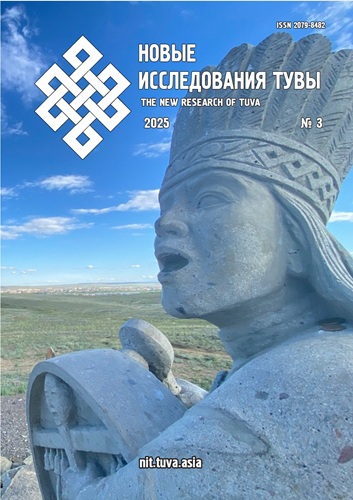Tuvan folklore and literature about commercial hunting of Tuvans
DOI:
https://doi.org/10.25178/nit.2025.3.4Keywords:
hunting; Tuvans; Tuvan folklore; Tuvan literature; Tuvan cultureAbstract
The article examines the role of commercial hunting in the traditional culture of the Tuvans and its reflection in Tuvan folklore and literature. Hunting is analyzed not only as a key sector of economic activity that ensured the survival of families and clan communities, but also as a vital element of the people’s ecological and spiritual culture. Special attention is given to the ritual aspects of hunting, including offerings to spirits, words of gratitude addressed to the master of the taiga, as well as taboos and euphemisms in hunting vocabulary related to mythological concepts of nature.
The authors provide a systematization of the most characteristic references to hunting found in various genres of Tuvan folklore (myths, legends, blessings) and in works by contemporary authors. The analysis considers texts in which hunting appears as a constant and essential occupation of the main characters, and traditional rituals and norms intended to preserve the balance between humans and nature are described. The article presents examples of folklore narratives in which hunting is accompanied by appeals to spirits, the observance of taboos, and the expression of respect for animals and the environment.
It is emphasized that the themes and motifs of hunting are deeply integrated into the oral and written heritage of the Tuvan people, reflecting their worldview, ecological attitudes, and cultural values.
References
Ayzhi, E. V., Mongush, A. M. (2020) Hunting traditions of the Tuvans: an ethnographic aspect. Oriental Studies, vol. 13, no. 5, pp. 1359–1370. (In Russ.) DOI: https://doi.org/10.22162/2619-0990-2020-51-5-1359-1370
Vainshtein, S. I. (1961) The Tuvans of Todzha: Historical-ethnographic essays. Moscow, Izdatelstvo vostochnoi literatury. 217 p. (In Russ.)
Vainshtein, S. I. (1972) Historical ethnography of the Tuvans: Problems of nomadic economy. Moscow, Nauka. 316 p. (In Russ.)
Vainshtein, S. I. (1991) The world of nomads of Central Asia. Moscow, Nauka. 226 p. (In Russ.)
Darzha, V. K. (2009) Traditional male occupations of the Tuvans. Vol. 1: Economy. Hunting. Fishing. Kyzyl, Tuvan book publisher. 590 p. (In Russ.)
Katanov, N. F. (1903) A study of the Uryankhai language with an indication of its main relationships to other Turkic languages. Kazan: Tipo-lit. Imperatorskogo Kazanskogo universiteta. 775 p. (In Russ.)
Kon, F. Ya. (1936) Fifty years. 2nd ed. / ed. by M. Chechanovsky. Moscow, Sovetskii pisatel'. Vols. 3–4. 356 p. (In Russ.)
Kormushin, I. V. and Oorzhak, A. Ch. (2024) On the names of hunting bags in the Tuvan language and its dialects. Rodnye yazyki i kultury v sovremennom izmenyayushchemsya mire, no. 3, pp. 10–18. (In Russ.)
Kuular, E. M. (2016) The lexicon of traditional tools and methods of trapping in the dialects of the Tuvan language. Filologicheskie nauki. Voprosy teorii i praktiki, no. 12(66), pp. 125–127. (In Russ.)
Kuular, E. M. (2018) Euphemisms in the hunting and fishing lexicon of the Tuvan language. Vestnik Khakasskogo gosudarstvennogo universiteta im. N.F. Katanova, no. 26, pp. 49–51. (In Russ.)
Lomakina, O.V. (2022) Omen as text of culture in the study of the languages of the peoples of Russia. Vestnik Chelyabinskogo gosudarstvennogo universiteta, no. 9 (467), pp. 133–140. (In Russ.)
Potapov, L. P. (1969) Sketches on the folk life of the Tuvans. Moscow, Nauka. 401 p. (In Russ.)
Radlov, V. V. (1861) Samples of Turkic folk literature. St. Petersburg: Akademiya nauk. 419 p. (In Russ.)
Salchak, V. S., Mongush, B. B. and Bayarsaikhan, B. (2010) Some information about the hunting economy of the Tuvans. Kyzyl, Tipographiya KTSO “Anyak”. 80 p. (In Tuvan).
Sat, Sh. Ch. (1981) Taboos and euphemisms in the Tuvan language. Sovetskaya tyurkologiya, no. 5, pp. 42–45. (In Russ.)
Suvandii, N. D. (2013) Hunting lexicon in the Tojin dialect of the Tuvan language. New Research of Tuva, no. 1, pp. 72–79. (In Russ.)
Suvandii, N. D. (2016a) Taboos and euphemisms in the hunting lexicon of the Tuvan language. Filologicheskie nauki. Voprosy teorii i praktiki, no. 5–2(59), pp. 81–36. (In Russ.)
Suvandii, N. D. (2016b) Customs and traditions in the hunting lexicon of the Tuvans. Kazanskaya nauka, no. 9, pp. 68–71. (In Russ.)
Suvandii, N. D. and Kuular, E. M. (2015) Hunting lexicon in the Tuvan language and its dialects. Kazanskaya nauka, no. 11, pp. 191–193. (In Russ.)
Chadamba, Z. B. (1974) The Tojin dialect of the Tuvan language. Kyzyl, Tuvan book publisher. 136 p. (In Russ.)
Yusha, Zh. M. (2007) The role of verbal hunting components in the rituals of the Tuvans. Uchyonye zapiski / TIGPI. Kemerovo, Kemerovskij gosudarstvennyj institut kultury. Vol. XXI. 408 p. Pp. 163–173. (In Russ.)
Published
How to Cite
For citation:
Mongush Sh. V. and Kuular E. M. Tuvan folklore and literature about commercial hunting of Tuvans. New Research of Tuva, 2025, no. 3, pp. 55-68. (In Russ.). DOI: https://doi.org/10.25178/nit.2025.3.4
Issue
Section

This work is licensed under a Creative Commons Attribution-NonCommercial 4.0 International License.

Author(s) license holder(s) grant rights for their work to the journal (grantee of a license) under the simple non-exclusive open license in accordance with Art. 1286.1 «Open license for a research work, work of literature or fine arts», Civil Code of the Russian Federation.
New Research of Tuva publishes articles under the Creative Commons Attribution-NonCommercial license (CC BY-NC).
Since it is an open license, author(s) reserve the right to upload the article to their institutional repository, submit it to another journal (if it allows republications), or republish it on their own website (in full, or in part).
However, several conditions apply here:
a) The republished version must always contain the name(s) and affiliation(s) of the author(s), the original title and the hyperlink to the original version on the New Research of Tuva website;
b) It must be in open access, free of charge, and no category of readers must be in any way whatsoever advantaged over general readership.
c) should the contribution be submitted elsewhere by its author(s) without substantial modification (30% or more of original text unchanged), the body of the article should contain a disclaimer that the original version was published in New Research of Tuva (with a link to the respective page)
The CC-BY-NC is a non-revocable license which applies worldwide and lasts for the duration of the work’s copyright.










